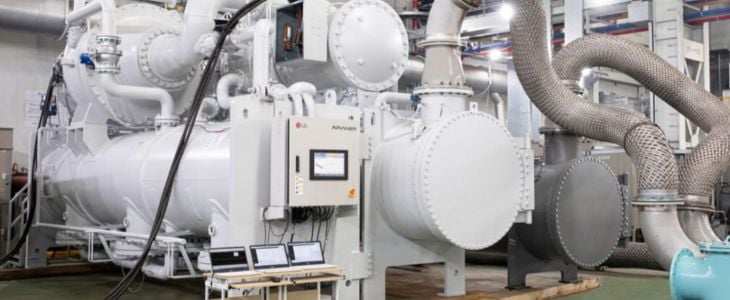As the role of the industries in global warming is increasingly acknowledged, the sustainability of steam generation is more and more discussed.
Heat pumps are in fact becoming key in the green transition due to their high efficiencies and the possibility for incorporating renewable energies, moving away from fossil fuels. In such a context, the possibility of high-temperature heat pumps to be employed for creating steam is opening new and exciting doors.
But how can heat pumps be involved in steam generation? Drawing from our experience in building cutting-edge industrial heat pumps, here’s a short introduction to steam generation by heat pumps.
The obsolescence of fossil fuel steam generation
Steam generation technologies play a crucial role in providing steam for a wide range of industrial processes and electricity generation, contributing to various sectors of the global economy.
However, in the midst of global efforts to minimize the climate crisis , the choice of technology for steam generation is essential.
Traditionally, the process relied on technologies such as fossil fuel boilers, burning fossil fuels (coal, natural gas, oil…) to produce steam.
Given the environmental issues raised by these technologies, designers and investigators have experimented with a number of other options. This is precisely where the first models for steam-generating heat pumps have arisen, which have been able to reduce CO2 emissions by up to 90%.
This trend is further understood in the wider context in which heat pumps have been increasingly incorporated across industries.
How does a heat pump work and how can it be used for steam generation
A heat pump works on the principle of heat transfer. In order to achieve it, it uses a refrigeration cycle that is able to move heat from one location to another.
When functioning in heating mode, the heat pump extracts heat from an external source—such as ambient air, water, or the ground—and releases it into the indoor environment. This process effectively raises the indoor temperature, making it suitable for space heating applications. Conversely, in cooling mode, the cycle is reversed: the heat pump absorbs heat from the interior and discharges it to the outside, thereby cooling the indoor environment. This dual functionality makes heat pumps a highly energy-efficient solution for climate control in both residential and industrial settings.
However, when we shift our focus to steam generation, it becomes clear that conventional heat pumps are not inherently designed to produce steam. Their standard configuration is optimized to deliver hot water, often at temperatures suitable for space heating or domestic hot water use but insufficient for direct steam generation. Steam, typically used in industrial processes or district heating networks, requires significantly higher temperatures and pressures than what standard heat pumps can provide on their own.
However, if the hot water produced by a heat pump is further heated, it can eventually turn into steam. This can be achieved by using additional heating elements, electric boilers, or other heat sources to raise the temperature of the water to the boiling point.

The efficiency of heat pumps steam
As we’ve mentioned above, heat pumps work by transferring heat and this is, precisely, the reason behind their high efficiency. In other words, heat pumps are energy-efficient because they move heat rather than generating it.
This is because this thermodynamic process can achieve a much higher coefficient of performance (COP) compared to conventional steam generation methods, leading to significant energy savings. In fact, heat pumps are welcomed as a truly efficient piece of equipment due to their capacity to convert lower-temperature heat (including heat that would otherwise go to waste) into useful, higher-temperature heat.
This working principle makes them a sustainable and cost-effective option for heating and cooling applications, and it’s also why they’re also a good choice for steam generation.
Other benefits of heat pumps for steam generation
Reduced greenhouse gas emissions
By employing electricity to power heat pumps (instead of burning fossil fuels), the direct greenhouse gas emissions associated with steam generation are reduced. This is especially beneficial when the electricity used to run the heat pump comes from renewable energy sources.
Versatility
Apart from steam generation, heat pumps can be used for various applications, such as space heating, water heating, and cooling.
Lower Operating Costs
Due to their higher energy efficiency, heat pumps can result in lower operating costs compared to traditional steam boilers, especially in the long run.
Less Maintenance
Heat pumps generally require less maintenance than traditional steam boilers. The main reason for this advantage is they have fewer moving parts, which leads them to experience less wear and tear.
At ARANER, we’re at the forefront of incorporating cutting-edge heating engineering into modern, sustainable and efficient infrastructure. From our experience in designing large heat pumps for district heating to high-temperature heat pumps for the industry, we aim at providing each project with the right heat pump.
If you’re looking for ways to improve efficiency and sustainability in steam generation, we can help you. Find out more about our industrial heat pumps or get in touch with us to discover how we can help you.










